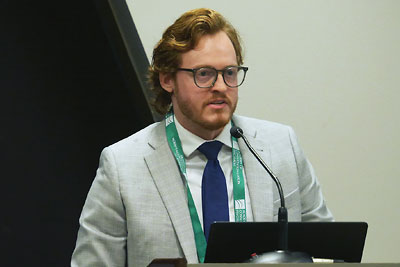Psychiatrists Vital to Care of Patients With Long COVID
Abstract
The lived experience of patients with post-COVID-19 symptoms is often devastating and overwhelming. At the Academy of Consultation-Liaison Psychiatry meeting, experts discussed how psychiatrists can help these patients.
Psychiatrists are uniquely qualified to help manage and treat patients with post-acute neuropsychological symptoms of COVID-19—popularly known as “long COVID,” said psychiatrists at the meeting of the Academy of Consultation-Liaison Psychiatry in Atlanta last November.
The nature and course of long COVID and its neuropsychiatric manifestations appears to be impacted by biomedical, psychological, and social factors.

“I think it is appropriate to support short-term disability for these patients, particularly those pursuing rehabilitation, which can often be time intensive,” says Nathan Praschan, M.D., M.P.H.
“Long COVID is a challenge because there isn’t an established definition, and there are no specific biomarkers for the disease,” said Nathan Praschan, M.D., M.P.H., a clinical fellow in behavioral neurology and neuropsychiatry at Massachusetts General Hospital. “I would argue that in light of all that is unknown and uncertain [about long COVID], psychiatrists are uniquely positioned to manage this condition because we are a specialty that is somewhat used to dealing with the unknown.”
Moreover, Praschan said that much about long COVID is similar to other challenging illnesses such as Myalgic encephalomyelitis (chronic fatigue syndrome), fibromyalgia, chronic Lyme disease, and somatoform disorders.
A June 2022 study in The Journal of Neuropsychiatry and Clinical Neurosciences, co-written by Praschan, showed that the most prevalent symptoms after COVID-19 infection were fatigue, “brain fog,” headache, anxiety, and sleep issues. Brain fog refers to symptoms of inattention, slowed processing, self-monitoring errors, and memory deficits.
He said ongoing clinical trials of long COVID patients have used broad inclusion criteria—one or more symptoms at least 30 days after resolution of the acute illness. “That’s pretty broad and encompasses a lot of people and a lot of symptomatology, which speaks to the heterogeneity of this condition,” said Praschan, who noted that an estimated 12% of individuals who develop COVID may experience more than one symptom more than 60 days after the acute illness.
Praschan and other psychiatrists at the session emphasized that the lived experience of patients who come to clinical attention for post-COVID symptoms is often devastating and overwhelming. “Their experience is that this is a very sudden and debilitating change in their lives with a dense burden of neuropsychiatric symptoms,” Praschan said.
He noted that long COVID is now the preferred term among patients with these conditions.
Though there are no definitive biomarkers, there are some common findings among patients who experience long COVID: brain scans often indicate lowered metabolism in the olfactory bulb, cerebellum, and brain stem; inflammatory markers, such as C-reactive protein and D-dimer, are typically elevated in patients who were hospitalized for COVID-19.
There is no agreed upon typical course of disease, but there are risk factors that predispose patients to long COVID including being female, being unvaccinated, and having prior psychiatric illness. The severity and course of acute COVID-19 infection also appear to be associated with long COVID: patients who have five or more COVID symptoms, those who were hospitalized, and those who experienced early difficulty breathing appear to be more likely to experience long COVID.
Praschan cited a November 2022 commentary in the New England Journal of Medicine (NEJM), “Cognitive Deficits in COVID-19,” which drew on an earlier study in Cell showing how COVID-19 infection could lead to neuroinflammation. The investigators in the Cell study modeled mild respiratory COVID in a mouse expressing the viral-entry receptor for SARS-CoV-2 in the trachea and lung by delivering SARS-CoV-2 intranasally.
“They detected no SARS-CoV-2 in the brain but found signs of neuroinflammation in elevated levels of chemokines in cerebrospinal fluid and serum,” the NEJM paper stated. “These changes led to activation of microglia in subcortical and hippocampal white-matter regions … with distinct effects on specific neural cell populations. Of note, these findings were supported by similar results in a small group of patients who were found to have SARS-CoV-2 infection and no severe lung damage at the time of death.”
Praschan outlined some general principles for management of long COVID that he said apply more generally to neuropsychiatric conditions:
In the absence of any disease-modifying treatment or clear definition, it is important to identify co-occurring modifiable syndromes—depression, anxiety, and sleep disorder—and treat those.
A team-based approach is vital because patients have a variety of symptoms. “Lean on your colleagues in other specialties, especially allied health professionals, because medications may not always be helpful.”
Choose medications that target functional improvement, not just symptom resolution. “Really try to get patients back into their lives as much as is possible.”
Keep an open mind, and use patients’ preferred terminology for their symptoms and illness.
Praschan said patients with long COVID requiring lengthy rehabilitation will likely need to take off time from work. “I think it is appropriate to support short-term disability for these patients, particularly those pursuing rehabilitation, which can often be time intensive,” he said. “Many of these patients are not getting better quickly, and having trouble meeting their financial requirements is only going to prolong their illness.” ■



